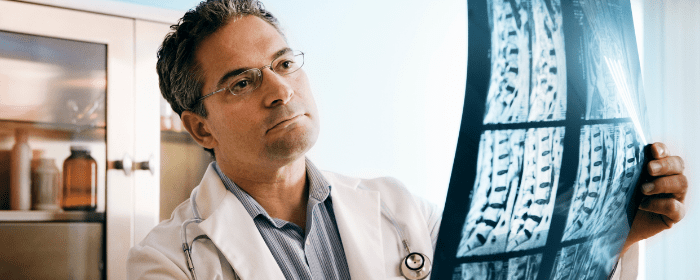Spinal cord injury (SCI) continues to be a significant cause of disability. In fact, it is estimated that annual SCIs account for nearly 18,000 injuries in the United States and between 250,000 and 500,000 injuries worldwide[1]. While the main cause of SCIs in the United States continues to be motor vehicle accidents, other contributors include falls, recreational accidents, and complications from medical procedures.
In their attempt to minimize damage after SCI, researchers have proposed several treatment options. This review conducted by Zoehler and Rebellato identifies cell therapy, and specifically treatment with mesenchymal stem cells (MSCs), as the primary form of neuroregenerative treatment for SCIs.
Research has shown that mammals are unable to regenerate nervous cell tissue in an area damaged as a result of a SCI, which means currently they will be subject to permanent disability after suffering such an injury.
Current treatments for SCIs have proven unable to repair the damage, rather they are used to relieve SCI-associated symptoms, including pressure and scarring, while also attempting to reduce hypoxia resulting from edema and hemorrhaging. One such treatment, spinal compression surgery, has shown to be successful at achieving these outcomes with results being much better if the surgery is completed within 24-hours of the SCI.
Another treatment currently used after SCI is methylprednisolone sodium succinate (MPSS) administered intravenously. In addition to inhibiting lipid peroxidation, MPSS inhibits post-traumatic spinal cord ischemia, supports aerobic energy metabolism, and attenuates neurofilament loss. However, because this treatment is associated with gastrointestinal bleeding and infection, it is recommended to be used with caution.
While not yet fully understood, cell therapy – and specifically therapy using MSCs – has presented promising findings related to regenerating tissue after a SCI. It is widely believed that MSCs effectiveness is related to their ability to secrete different factors and biomolecules.
MSCs also reduce inflammation, which is important in this application because inflammation is known to be a secondary event after sustaining initial SCI.
The authors point out that a better understanding of the specific mechanisms related to the regenerative effects of MSCs used when treating SCI is required in order to develop future MSC-based treatments designed to address SCI in humans. Currently, despite the recent increased focus on the use of cell therapy to treat SCI and central nervous system trauma, there is no consensus on a number of essential topics, including cell type, source, number of cells infusion pathways, and number of infusions to achieve this goal.
Zoehler and Rebellato also point out that it’s important to better understand how the reorganization of injured neural tissues associated with MSCS is related to the restoration of neural function.
Numerous animal model and human clinical trials have confirmed the regenerative and neuroprotective potential of MSCs without adverse effects during or after infusion. The authors close this review by highlighting that MSCs continue to demonstrate potential as an alternative for SCI therapy, primarily because the therapy is not limited by the time of injury and has shown measurable improvements in patients with complete and incomplete SCI.
Source: Fracaro L, Zoehler B, Rebelatto CLK. Mesenchymal stromal cells as a choice for spinal cord injury treatment. Neuroimmunol Neuroinflammation 2020;7:1-12. http://dx.doi.org/10.20517/2347-8659.2019.009
[1] “Spinal cord injury – WHO | World Health Organization.” 19 Nov. 2013, https://www.who.int/news-room/fact-sheets/detail/spinal-cord-injury.


 St. Petersburg, Florida
St. Petersburg, Florida
